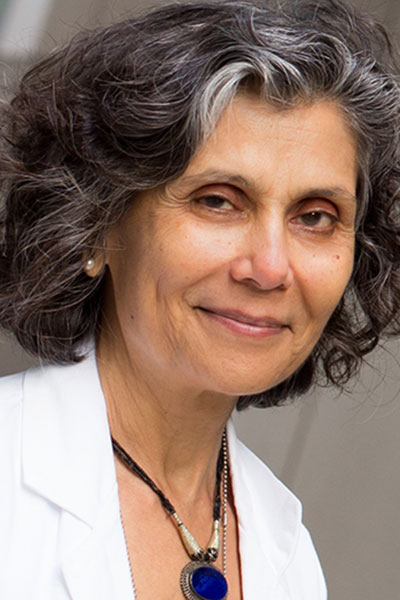
There is good evidence for best practices in managing individuals at high genetic risk for breast cancer and general agreement on clinical approaches. But until recently, there has been less evidence and less agreement on how to manage those at more moderate genetic risk.
“There is fairly good consensus on the management of women who carry high penetrance genes, women with lifetime risk for breast cancer approaching 60% or 70%,” said Seema A. Khan, MD, Professor of Surgical Oncology at the Feinberg School of Medicine and Robert H. Lurie Comprehensive Cancer Center of Northwestern University. “Moderate risk is in the region of 20% to 40% lifetime risk, and with the increasing use of genetic testing across different populations, these questions are coming to the forefront more often than in the past. Recent literature may be able to offer a better evidence base for considering effective and less burdensome approaches.”
Dr. Khan will moderate Management of Hereditary Risk: Moderate-Risk Genes and New Approaches on Thursday, from 3:00 pm – 5:00 pm CT in Hemisfair Ballroom 1&2. The latest evidence could impact not just breast cancer treatment but also risk assessment, screening, and exogenous hormonal exposures from contraceptives and other common uses.
Payal D. Shah, MD, Assistant Professor of Medicine, Hospital of the University of Pennsylvania, will open the session with a look at recent literature that can guide approaches to assessing risk for breast cancer genes with moderate penetrance. Because their underlying risk for developing breast cancer is more moderate, there is more room for discretion and shared decision-making in both screening and prevention strategies, Dr. Khan noted.
Breast cancer screening, usually mammography at annual or longer intervals, is routine for most women. Women at high genetic risk can benefit from more intensive screening with mammogram plus MRI every 6 to 12 months.
“That intensive screening schedule can be burdensome and expensive,” Dr. Khan said. “And new evidence suggests that it may not be required, or even be beneficial, for women at moderate risk.”
Madeleine M.A. Tilanus-Linthorst, MD, PhD, Erasmus University Medical Center, Rotterdam, Netherlands, will explore the evidence for less burdensome and less expensive screening programs for women at moderate genetic risk. Women at moderate risk need more intensive screening than those without genetic risk, Dr. Khan said, but not to the same degree as those at high genetic risk.
Joanne Kotsopoulos, MSc, PhD, Associate Professor of Nutritional Sciences and Canada Research Chair in Hereditary Breast and Ovarian Cancer Prevention, University of Toronto, will discuss new developments and practical implications of recent findings regarding exogenous hormonal exposures and breast cancer risk for BRCA1/2 carriers.
“There has been a lot of discussion about the use of hormonal contraceptives, hormone replacement for menopausal women, and other exogenous hormonal exposures in the general population,” Dr. Khan said. “Those concerns are elevated when it comes to women at moderate and high genetic risk for breast cancer. We all get those questions on a regular basis and recent data could make a difference in the ways we approach those questions.”

